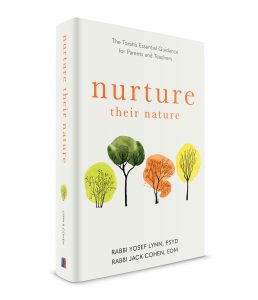
Olami Resources is honored to present the fourth in a series of free chapters featuring Rabbi Dr. Yosef Lynn’s and Rabbi Jack Cohen’s important new book, Nurture Their Nature. Rabbi Lynn serves asMashgiach at Machon Yaakov, Jerusalem and Rabbi Cohen is Director of Education for OLAMI, North America. The sefer is predominantly a synthesis of Rabbi Beryl Gershenfeld’s Torah on individuality and self-esteem in Jewish education.
This week we are featuring the concluding installment, Chapter 13, The Creation of the World.Our sincere thanks to the authors for sharing their publication with the rabbis and educators subscribed to OlamiResources.com. Purchase a copy of Nurture Their Nature.
__________________________________
The Creation of the World
At this point, we’d like to zoom out and consider the general approach of positivity that we’ve been taking. A big part of us still may want to first deal with our weaknesses. The approach of focusing on positives features prominently in the most fundamental teachings of the Torah. This is precisely what we will learn in this section.
We will start with the concept of gratitude for the qualities with which we were endowed. As surely as gratitude is due for the blessings we’ve received all around us, our unique strengths, which define our
individuality to our core and shape our lives, deserve especially deep and constant gratitude. Building a life based on these strengths is fueled by the constant appreciation and debt of gratitude for these gifts.
It follows then that the engine to power our lives is our capacity to appreciate.
Appreciation features centrally in the Torah as early as, and even prior to, the creation of mankind. The Chumash opens by revealing Adam HaRishon’s essential role in the Creation — the slot he was made
to fill — before he was created:
Bereishis 2:5
וכל שיח השדה טרם יהיה בארץ וכל עשב השדה טרם יצמח כי לא המטיר ה’ אלקים
על הארץ ואדם אין לעבד את האדמה.
All the plants of the field were not yet on the earth, and all the vegetation of the field had not yet sprouted, because Hashem Elokim had not caused it to rain on the earth, and man was not
[there] to work the soil.
Rashi looks at this verse and is bothered by the seemingly overcomplicated explanation as to why there was no plant life on earth. Was it because there was no rain (a seemingly more obvious reason) or because there was nobody to work the earth (a seemingly non sequitur since plants need rain regardless of people working the soil)?
כי לא המטיר. ומה טעם לא המטיר, לפי שאדם אין לעבוד את האדמה ואין מכיר בטובתם של גשמים,
וכשבא אדם וידע שהם צורך לעולם התפלל עליהם וירדו, וצמחו האילנות והדשאים.
“Because [Hashem Elokim] had not caused it to rain.” For what reason did He not bring rain? Since “man was not [there] to work the field,” and there was no one to recognize the goodness of the rains. When man came and realized that they were necessary for the world, he prayed for them [the rains], and they fell, and the trees and plants sprouted.
Rashi’s careful reading of the Torah’s words reveal that man’s very creation was to recognize the potential around him, to pray for what was needed for that potential to be realized, and by doing so, to fill the world with the blossoming of life. This explains the otherwise cumbersome flow of the verse: there was no plant life because it had not rained, and it had not rained because there was no one to appreciate the value of the rain.
The Maharal elucidates the mechanics as to why Hashem “needed” us to recognize the goodness of blessings in order to receive them:
ואין מכיר בטובתם. כלומר, ואסור לעשות טובה לאיש שאין מכיר
בטובה, ולפיכך כל זמן שלא היה האדם, לא המטיר.
“There was no one to recognize the goodness of the rains,” means that since it is forbidden to do good for someone who does not recognize that goodness, as long as there was no humanity, it did not rain. [1]
The Maharal shows us that Rashi is revealing a fundamental life principle beyond the historical event of how Adam HaRishon was created: Hashem gives to us only to the degree to which we can “recognize
the goodness” of that which He is giving to us. We could explain the mechanism as follows: If we recognize it as goodness, then it is indeed “good” and draws us closer to Him, but if we were to take the goodness for granted, it would just make us more spoiled and numb, and would therefore no longer be called “goodness” at all.
Continue reading The Creation of the World.
Read Chapter 11, Learning about Ourselves from the Avos.
Read Chapter 10, Drawing from Our Deepest Source of Strength.
Read the Introduction to Nurture Their Nature.
Purchase a copy of Nurture Their Nature.
[1] According to Rav Yehoshua Hartman, this comment of the Maharal is based on the Gemara in Berachos 33a: וכל מי שאין בו דעה אסור לרחם עליו” — It is forbidden to have mercy on a person who has no de’ah.” This statement of Chazal is not speaking about people who halachically have no daas like children and those who are mentally unwell (see the published correspondence, in Eitzos V’Hadrachos between the Steipler Gaon and Rabbi Dr. Yaakov Greenwald, which clarifies this point). It is a mitzvah to help people who are categorically incapable of helping themselves; this is chessed. Chazal are cautioning us against rachamim (mercy) toward a person with no sense of appreciation. Rachamim is giving with an expectation that the recipient will grow from the gift and come to take more responsibility for himself. But when a person is not appreciative, not only will gifts not help — they will make the recipient
feel more entitled, and therefore less responsible for himself — hence the prohibition.



















